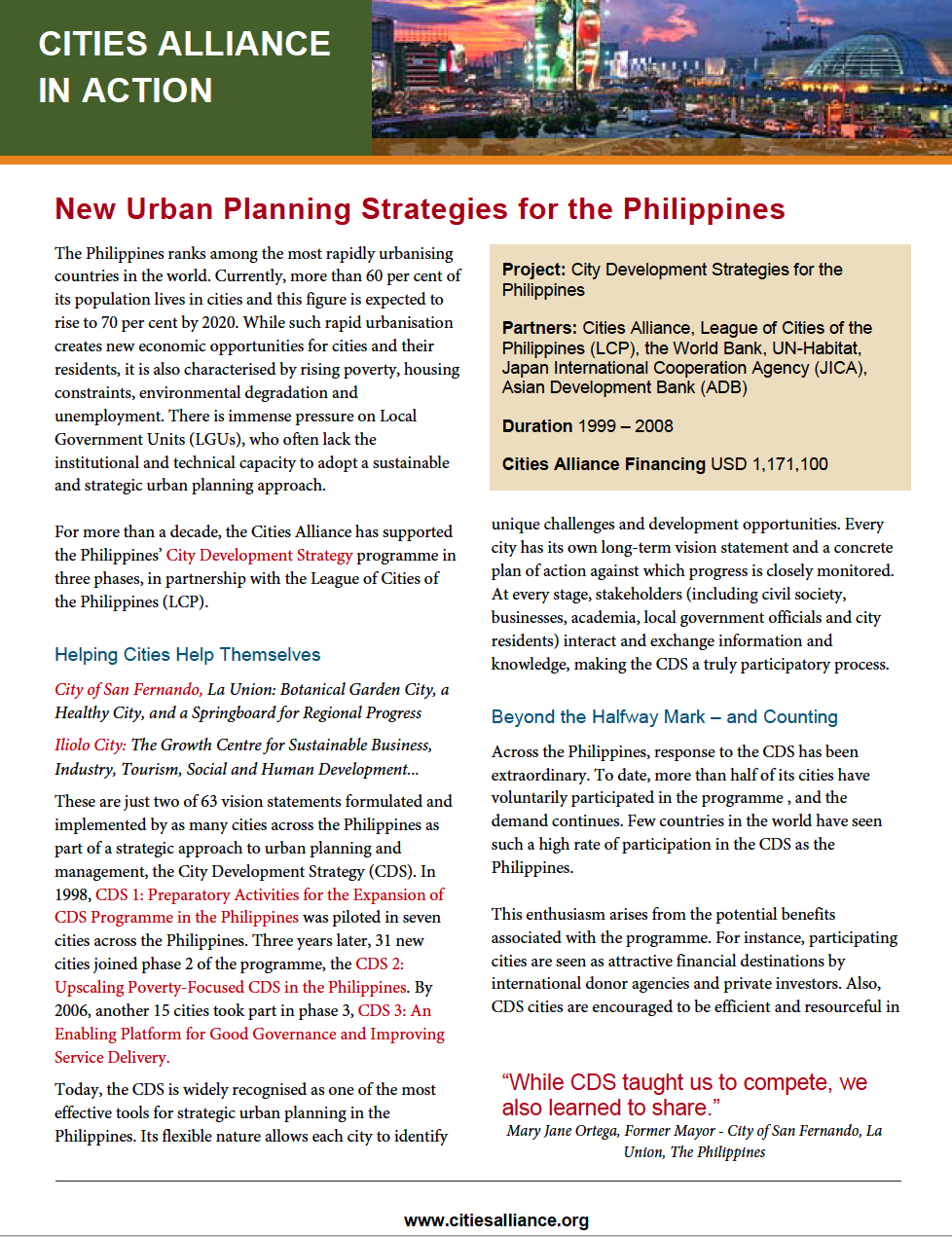- Who We Are
- How We Work
- Regional / Country Initiatives
- Legacy
- Core Themes
- Working Groups
- Portfolio & Results
- Newsroom
- Resources
Transforming Urban Policy-Making in Vietnam
The Cities Alliance has supported the Vietnamese Government’s shift toward a more inclusive urban development model and a new emphasis on broad-based upgrading programmes, which have proved more sustainable.
Vietnam is in the midst of rapid urbanisation, driven by impressive economic growth. But although the country’s overall poverty levels have declined, urban poverty rates are growing. A majority of the urban poor are unregistered migrants working in the informal sector. They live in informal settlements with little access to infrastructure and basic services, often in deplorable living conditions.
In 1998, Vietnam adopted a master plan that spelled out the government’s urban policy but fell short of providing meaningful strategies for efficient urban planning and management. So the government decided to revise it.
Introducing Urban Upgrading in Vietnam
In 2000, the Vietnamese government sought international donor assistance to address its growing urban policy challenges, especially upgrading low-income communities. The Cities Alliance agreed to fund detailed research studies that would contribute to the design of a national urban upgrading programme.
From 2001 to 2003, World Bank-managed consultants carried out four in-depth studies to: assess the housing and infrastructure constraints faced by the urban poor; review ongoing national and international urban upgrading programmes; develop a detailed action plan for the city of Can Tho; and prepare a national strategy for expanding upgrading programmes and providing better housing and services to the urban poor.
Their reports provide a comprehensive picture of the challenges facing low-income communities in urban Vietnam. They also offer specific recommendations, including the in-situ upgrading of settlements.
Based on the reports, in 2004, the government launched the Vietnam Urban Upgrading Project (VUUP), a 10-year, USD 417 million project partly funded by the World Bank and other donors. Its objective was to improve living conditions for the poor and make planning processes more inclusive and pro-poor. By focusing on four cities (Hai Phong, Nam Dinh, Co Chi Minh City, and Can Tho), it served as a test case for the national urban upgrading programme.
The Cities Alliance-funded studies also guided the Ministry of Construction to develop the National Urban Upgrading Strategy and Overall Investment Plan for Urban Upgrading to the Year 2020 (NUUP), which was approved by the government in 2009 and focuses on upgrading basic infrastructure and services in low-income areas in 96 cities across Vietnam. It also promotes participatory planning methods.
Building on the Foundation
The VUUP and NUUP reflect the government’s shift toward a more inclusive urban development model, as well as a new emphasis on broad-based upgrading programmes, which have proved more sustainable.
VUUP has contributed to significant improvements in Vietnam’s urban environment. Access to basic services such as water supply, drainage, roads and lighting has improved, and at least 200,000 low-income people now have access to better health centres, kindergartens and primary schools.
As a result of these accomplishments, the World Bank launched a second urban upgrading project, this time focusing on providing infrastructure that will improve living conditions for low-income residents in six cities vulnerable to climate change in the Mekong Delta region, while emphasising community participation and limiting resettlement impacts. The $292 million Mekong Delta Region Urban Upgrading Project will also build capacity to help the country implement the NUUP.
Supporting the Roll-Out of the New Plan
As part of its new Country Programme, the Cities Alliance is assisting the Ministry of Construction to develop a detailed implementation strategy that spells out the legislative, policy and regulatory framework for the NUUP.
International and national consultants will be engaged for this purpose. They will assess past urban upgrading programmes (in Vietnam and elsewhere) as well as the current institutional and regulatory context, and recommend how to best proceed to develop a feasible national programme. They will also take stock of existing financing arrangements for successful national programmes in Vietnam and identify feasible options to leverage and mobilise the substantial resources needed for this effort, as well as systems and procedures for the effective management and disbursement of NUUP funds.
The Country Programme is also reenergising the Vietnam Urban Forum (originally launched in 2003), to provide a platform for discussing urban issues (including NUUP implementation). The Cities Alliance is funding the VUF secretariat and helping it develop a long-term strategy. The forum added 30 new members in 2012, bringing its total membership to more than 90. This now includes cities and communities and, more recently, representatives of the private sector.
At the city level, the country programme is facilitating the development of City Development Strategies and training on strategic urban planning and management for mayors and other city officials. And at the community level, it is focusing on citywide upgrading through the Community Development Fund network, a network of 30 cities engaged in community-led upgrading activities.
|
| “Vietnam will only have one chance to get urbanisation right. If we fail at urbanisation, we will fail at industrialisation and modernisation.” Deputy Prime Minister Nguyen Sinh Hung (2009) |

